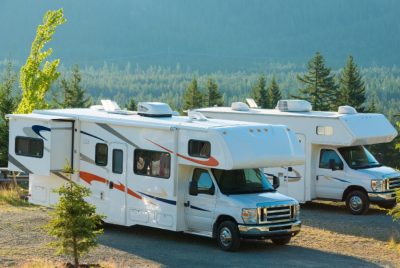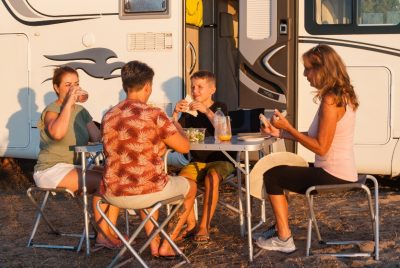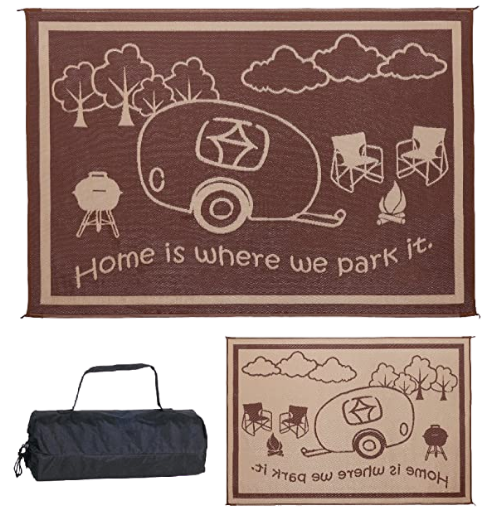There’s something magical about hitting the open road in an RV, watching the landscape change as…
10 Budget RVing Tips To Stretch Your Travel Dollars

Traveling in an RV can be the adventure of a lifetime, but the costs can quickly add up if you’re not careful.
From fuel prices to campground fees, meals, and maintenance, it’s easy to see how even a modest trip can put a strain on your wallet.
Traveling the country doesn’t have to break the bank. With some planning, creativity, and insider know-how, it’s entirely possible to enjoy the freedom of the open road while keeping your expenses in check.
We’ve spent years on the road and learned firsthand how to stretch every dollar without sacrificing comfort, convenience, or the joy of RVing.
Here are 10 practical, actionable tips to help you save money while maximizing your travel experience.
Whether you’re a full-time RVer or a weekend warrior, these strategies will help you get more mileage out of your budget.
1)) Choose the Right RV for Your Budget
One of the most important steps in RVing on a budget is selecting a rig that fits your lifestyle and wallet.
Many people assume bigger is better, but larger motorhomes or luxury trailers often come with hidden costs — higher fuel consumption, increased maintenance, more expensive insurance, and costly storage fees.
Instead, consider a smaller, more efficient rig. A lightweight travel trailer or Class B campervan can drastically reduce fuel costs while still offering the essentials for a comfortable adventure.
Even within Class C or larger models, opting for a slightly older or gently used vehicle can save thousands upfront.
Tips for choosing the right RV:
- Fuel efficiency: Smaller, lighter rigs often use less fuel. Every mile counts.
- Maintenance history: Look for vehicles with a documented maintenance record to avoid expensive surprises.
- Essential features: Identify what you truly need — slide-outs, full bathroom, or kitchen appliances — and skip the extras that add weight and cost.
- Ownership model: Renting an RV initially can be a great way to test the lifestyle before investing in a purchase.
We’ve found that being deliberate about size and features can save hundreds, sometimes thousands, per trip without compromising the adventure.
2)) Plan Your Route to Save on Fuel
Fuel is one of the biggest ongoing expenses for RVers, so route planning is crucial.
The more miles you drive, the more fuel you’ll burn, and those costs can add up quickly.
Smart route planning lets you maximize your travel while minimizing unnecessary driving.
Strategies to save on fuel:
- Travel slowly: Driving at 55–60 mph instead of pushing your rig to 70 mph can improve fuel efficiency.
- Use fuel-finding apps: Apps like GasBuddy or Roadtrippers help you locate the cheapest fuel along your route.
- Combine errands and destinations: Map your stops logically to avoid backtracking or unnecessary detours.
- Consider seasonal planning: Traveling off-peak can reduce congestion and fuel consumption while giving you access to lower-cost campsites.
We’ve personally saved hundreds of dollars in a single month just by plotting a more efficient route and driving more strategically. It may seem small, but it adds up fast over weeks and months on the road.
3)) Camp Smart and Save on Nightly Fees
Campground fees can be a significant portion of your RV budget. High-end resorts with full hookups may be tempting, but they can quickly eat into your travel funds.
There are several ways to reduce or even eliminate these costs.
Budget-friendly camping tips:
- Boondocking: Camping on public lands without hookups is free or very low cost. National forests, BLM lands, and some state lands are excellent options.
- Walmart, Cracker Barrel, and other legal parking: Some big-box stores and restaurants allow overnight RV parking. Always check local laws and store policies first.
- Membership programs: Harvest Hosts, Passport America, and Good Sam Club offer discounted or free camping at various locations.
- Extended stays: Many campgrounds offer weekly or monthly rates that significantly reduce nightly costs.
When we first discovered boondocking, it completely transformed how we budgeted our trips.
The initial learning curve is worth it — and the experience of staying under the stars in secluded spots is priceless.
4)) Cook Your Own Meals and Plan Ahead
Food is another area where RVers can save significantly. Eating out at restaurants or grabbing takeout every night can quickly drain a tight budget. Cooking in your RV or at a campsite kitchen is both economical and fun.
Food-saving strategies:
- Meal prep: Plan meals for the week before you hit the road. This reduces waste and keeps you from spending on last-minute convenience meals.
- Stock up in bulk: Buy staples like rice, pasta, canned goods, and snacks at wholesale stores such as Costco or Sam’s Club.
- Portable grills and campfires: These allow you to cook outside, which is both enjoyable and budget-friendly.
- Simple, hearty meals: One-pot dishes, slow-cooker meals, and sheet-pan dinners are easy to prepare in a small RV kitchen.
We’ve found that a little planning can cut food costs by 40–50% compared to dining out regularly. Plus, cooking on the road can be a fun part of the adventure.
5)) Take Advantage of Free and Low-Cost Activities
Entertainment doesn’t have to be expensive. In fact, some of the best experiences RVing offers are free or extremely low-cost. Parks, trails, and local events can provide memorable adventures without breaking the bank.
Budget-friendly activity ideas:
- Hiking and nature walks: Almost all national and state parks have free or low-cost trails.
- Beaches, lakes, and rivers: Swimming, fishing, or kayaking often come with little to no cost.
- Local festivals and community events: Check city calendars for free concerts, fairs, and cultural events.
- National and state park passes: An annual pass can save money if visiting multiple parks.
One of our most memorable trips was camping near a national forest and spending days exploring trails and waterfalls — all for the cost of a single campsite.
Experiences like these prove you don’t need to spend a lot to have an unforgettable adventure.
6)) Leverage Technology to Find Deals
Technology can be a RVer’s best friend when it comes to stretching travel dollars.
Numerous apps and websites can help you locate the cheapest gas, campsites, and even grocery stores along your route.
Apps and tools we recommend:
- GasBuddy: Compare gas prices along your route.
- AllStays: Find campgrounds, RV parks, dump stations, and more.
- Roadtrippers: Plan your route efficiently and find points of interest.
- Groupon and local deal sites: Find discounted activities, attractions, or dining options.
By using these tools, we often uncover hidden gems and discounts that aren’t widely advertised. The time spent researching can result in significant savings over the course of a trip.
7)) Manage Utilities Wisely
Utilities like water, electricity, and propane can add up, especially when staying at campgrounds with hookups.
Being mindful of consumption can help you save money while still staying comfortable.
Utility-saving strategies:
- Water conservation: Use a water-saving showerhead and monitor your fresh and gray water tanks.
- Solar panels: Investing in solar panels can offset electrical costs for lighting, small appliances, and battery charging.
- Propane management: Track propane usage and refill in larger towns where prices are lower.
- Hookup awareness: Turn off unnecessary appliances and conserve energy when possible.
Simple changes, like being conscious of water use or charging batteries only when needed, make a measurable difference in your monthly budget.
8)) Maintain Your RV Proactively
Nothing drains your budget faster than unexpected repairs. Regular maintenance is an investment that keeps your RV safe, reliable, and cost-efficient.
Maintenance tips for budget RVing:
- Regular inspections: Check tires, brakes, fluid levels, and seals before each trip.
- Preventive care: Clean tanks, lubricate slide-outs, and winterize if necessary.
- DIY repairs: Learn basic RV maintenance like replacing fuses, fixing leaks, or minor plumbing repairs.
- Track maintenance costs: Keep a spreadsheet to see patterns and avoid surprise expenses.
We’ve personally avoided costly breakdowns many times by adhering to a strict maintenance schedule. Being proactive saves money and stress on the road.
9)) Use RV Memberships and Loyalty Programs
Memberships can be a game-changer for RVers looking to maximize value. These programs offer discounts on campgrounds, fuel, supplies, and even attractions.
Popular memberships:
- Passport America: Offers 50% off campground fees at thousands of locations.
- Good Sam Club: Discounts on campgrounds, RV supplies, and extended warranties.
- Harvest Hosts: Provides overnight camping at wineries, farms, and attractions for a small annual fee.
- AAA or other travel clubs: Roadside assistance and travel discounts.
We found that a single membership often pays for itself within a month of travel, making it one of the smartest investments for anyone RVing on a budget.
10)) Track Your Expenses and Budget Carefully
Finally, no budget plan is complete without careful tracking. Knowing where your money goes helps you make informed decisions and find areas to cut costs.
Tips for budget tracking:
- Spreadsheet or app: Track fuel, campgrounds, food, and maintenance expenses.
- Set a daily or weekly budget: Helps prevent overspending and keeps travel sustainable.
- Review and adjust: At the end of each trip, analyze your spending and identify opportunities to save for the next journey.
- Plan for emergencies: Unexpected expenses happen; having a small buffer prevents them from derailing your trip.
Keeping a clear picture of your spending allows you to stretch your travel dollars without sacrificing experiences or comfort.
We’ve learned that the simple act of tracking expenses often reveals hidden savings opportunities we would have otherwise missed.
Conclusion
Rving on a budget is not only possible, it can be incredibly rewarding. By making intentional choices, planning, and embracing creativity, you can enjoy the freedom of the open road without overspending.
From selecting the right rig and planning efficient routes to cooking your own meals and leveraging memberships, every dollar saved adds up to more opportunities for adventure.
Budget-conscious RVing is about smart choices, flexibility, and resourcefulness — not about cutting out the fun.
With these ten tips, we hope to inspire you to hit the road confidently, knowing that stretching your travel dollars is not only achievable but can make your RVing experience even more enjoyable.
Every mile, meal, and campground choice is an opportunity to make your adventure more cost-effective — and with careful planning, you can turn budget constraints into a creative, fulfilling journey.





